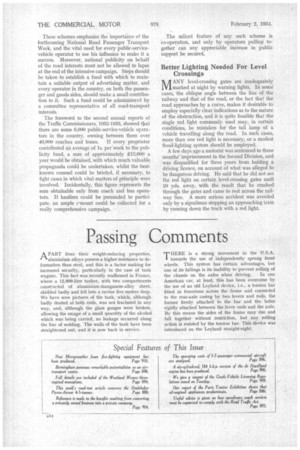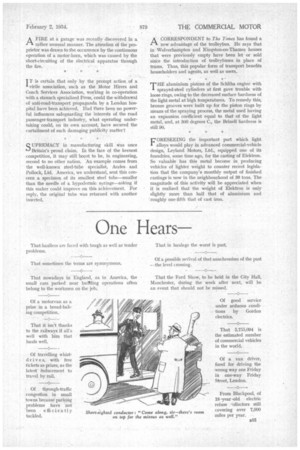Passing Comments
Page 28

Page 29

If you've noticed an error in this article please click here to report it so we can fix it.
APART from their weight-reducing properties, aluminium alloys possess a higher resistance to deformation than steel, and this is a factor making for increased security, particularly in the case of tank wagons. This fact was recently reaffirmed in France, where a 12,000-litre tanker, with two compartments constructed of aluminium-manganese-alloy sheet, skidded badly and fell into A ravine five metres deep. We have seen pictures of the tank, which, although badly dented at both ends, was not fractured in any way, and, although the glass gauges were broken, allowing the escape of a small quantity of the alcohol which was being carried, no leakage occurred along the line of welding. The walls of the tank have been straightened out, and it is now back in service. THERE is a strong movement in the U.S.A. towards the use of independently sprung front wheels. This system has certain advantages, but one of its failings is its inability to prevent rolliiCg of
the chassis on the axles when driving. In one American car, at least, this has been overcome by the use of an old Leyland device, i.e., a torsion bar fitted in trunnions across the frame atid connected to the rear-axle casing by two levers and rods, the former firmly attached to the bar and the latter rigidly attached between the lever ends and the axle. By this means the sides of the frame may rise and fall together without restriction, but any rolling action is resisted by the torsion bar. This device was introduced on the Leyland straight-eight.
AFIRE at a garage was recently discovered in a rather unusual manner. The attention of the proprietor was drawn to the occurrence by the continuous operation of a motor-horn, which was caused by the short-circuiting of the electrical apparatus through the fire.
T is certain that only by the prompt action of a A virile association, such as the Motor Hirers and Coach Services Association, working in co-operation with a staunch specialized Press, could the withdrawal of anti-road-transport propaganda by a London hospital have been achieved. Had there been no powerful influences safeguarding the interests of the road passenger-transport industry, what operating undertaking could, on its own account, have secured the curtailment of such damaging publicity matter?
UPREMACY in manufacturing skill was once ‘-)Britain's proud claim. rn the face of the keenest competition, it may still boast to be, in engineering, second to no other nation. An example comes from the well-known steel-tube specialist, Aceles and Pollock, Ltd. America, we understand, sent this concern a specimen of its smallest steel tube—smaller than the needle of a hypodermic syringe—asking if this maker could improve on this achievement. For reply, the original tube was returned with another inserted. ACORRESPONDENT to The Times has found a new advantage of the trolleybus. He says that in Wolverhampton and Kingston-on-Thames houses that were previously empty have been let or sold since the introduction of trolleybuses in place of trains. Thus, this popular form of transport benefits householders and agents, as well as users..
THE aluminium pistons of the Schliha engine with
sprayed-steel cylinders at first gave trouble with loose rings, owing to the decreased surface hardness of the light metal at high temperatures. To remedy this, bronze grooves were built up for the piston rings by means of the spraying process, the metal used having an expansion coefficient equal to that of the light metal, and, at 300 degrees C., the Brinell hardness is still 90.
FORESEEING the important part which light alloys would play in advanced commercial-vehicle design, Leyland Motors, Ltd., equipped one of its foundries, some time ago, for the casting of Elektron. So valuable has this metal become in producing vehicles of lighter weight to counter recent legislation that the company's monthly output of finished castings is now in the neighbourhood of 30 tons. The magnitude of this activity will be appreciated when it is realized that the weight of Elektron is only slightly more than half that of aluminium and 'roughly one-fifth that of cast iron.




























































































